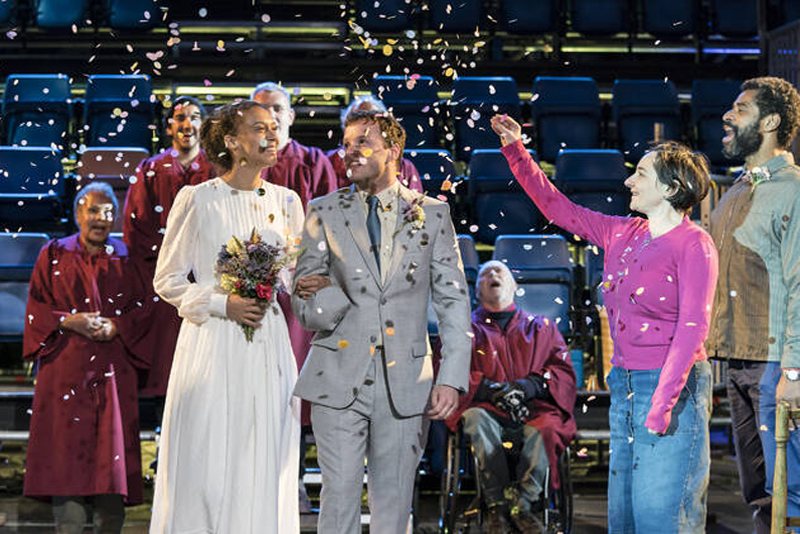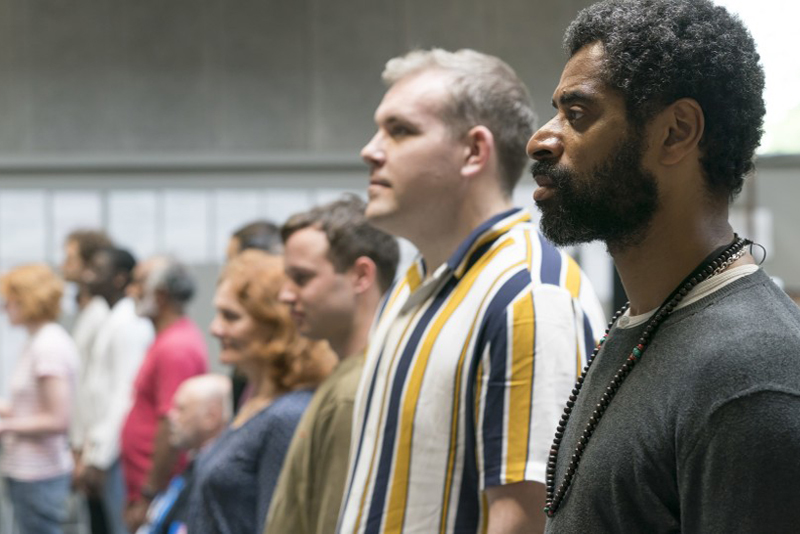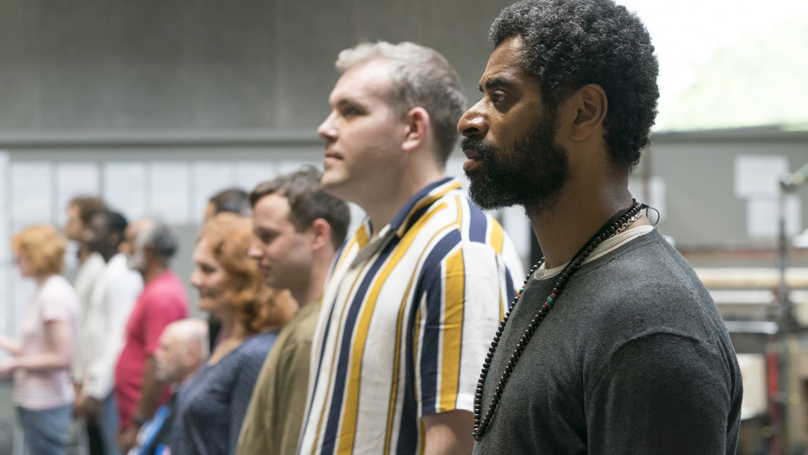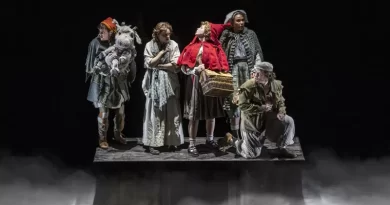“Our Town”: Regent’s Park
Eva de Valk in central London
1 June 2019
The characteristically to-the-point announcement: “This play is called Our Town” is how Thornton Wilder’s 1938 meta-theatrical marvel starts. It might have won a Pulitzer Prize, but Our Town is very much a love-it-or-hate-it kind of play. It’s definitely not an easy watch, which is as much due to its structure as its contents. In fact, a 1946 production in East Berlin was cancelled over worries it would cause a suicide wave among its audience members. Although it’s apparently quite the favourite in the USA, it doesn’t get much stage time in Europe (although, interestingly, there is coverage of a Tehran production of Our Town from the same time period on this website.) The play’s last major outing in London was the Almeida’s excellent 2014 production directed by David Cromer. Now director Ellen McDougall has taken up the gauntlet on behalf of Regent’s Park Open Air Theatre.
“Our town” is Grover’s Corners: a village in New Hampshire, at the start of the twentieth century. The play consists of three acts that the audience is guided through by the Stage Manager, who introduces us to the townspeople and the demographic make-up of the village, and manages the progression from one scene to the next. Act 1 – “Daily Life” – is mostly scene-setting; we meet the doctor, the newspaper editor, and the milkman; we learn that the inhabitants of Grover’s Corners are 86% Republican and 85% Protestant; we even hear that the town sits on “some of the oldest land in the world … A shelf of Devonian basalt crosses it with vestiges of Mesozoic shale.” It is, I imagine, not unlike what would happen if someone tried to stage a theatrical adaptation of a Wikipedia entry.

Francesca Henry and Arthur Hughes in Our Town. Photo credit: John Persson.
In Act II, which is entitled “Love and Marriage”, the characters get a bit more breathing space as we follow the unfolding romance between teenagers Emily and George. It also gives the audience more opportunity to get emotionally invested in the people on stage, right in time for Act III which changes pretty much everything you think you know about the play. If you’ve seen Our Town before, you’ll know what I mean; if not, I won’t spoil it for you – although after Wilder has told us about the birth and shown us a wedding, you can probably guess in which direction he’s heading.
Let me be honest here: Our Town is a weird play. The structure is weird: two long, slow acts before the interval, one very short one after. The tone will certainly not be to everyone’s liking. Wilder famously specified that it “should be performed without sentimentality or ponderousness – simply, dryly and sincerely”. Also – and again as per the playwright’s specifications – there are hardly any sets, props or costumes to speak of. Even the play’s brand of meta-theatre feels slightly strange: there’s none of that “wink wink nudge nudge” feeling of audience complicity with which Bertolt Brecht is often performed. Wilder makes it very clear that he knows you’re watching; he just doesn’t really seem to care. It’s this casual disregard for the audience that makes Our Town pretty hard work sometimes – but if you stick with it, it does pay off.
Despite having been written 80 years ago, the play feels remarkably modern. Perhaps timeless is a better word. Partly this is to do with lack of scenery. The cast appear in contemporary clothes, looking for all the world like they just rocked up to another rehearsal rather than an actual show. Bar one scene, the entire show was performed with nothing more than a couple of tables and chairs, the traditional stepladders that are usually employed having been replaced with seating banks (not unlike Regent’s Park’s own tiered seating) for this production. It’s a nifty staging choice that further heightens the meta-theatricality of the show: there’s something pleasantly bizarre about watching an actor perform while sitting directly across from you, almost at your eyelevel, in a seat that is very similar to your own. The other part of Our Town‘s timelessness comes from the story itself, which engages with things like the importance of community and the fleetingness of life. Both are topics that find easy resonance in this day and age, and probably still will twenty, fifty or a hundred years from now.

The ensemble in rehearsal for Our Town. Photo credit: John Persson.
I was not enamoured with all of the eighteen-strong ensemble cast, but the performances that matter the most are excellent. Francesca Henry stands out, playing Emily with an intensity that is slightly disconcerting and very likeable. Laura Rogers perfectly captures the dry tone of the Stage Manager. There’s a hint of David Attenborough about the way she frames the comings and goings of the townsfolk: detached but always sympathetic, even with a hint of mischief here and there. Pandora Colin and Thusitha Jayasundera deliver strong performances as Mrs Gibson and Mrs Webb respectively. Nevertheless, it’s hard to escape the feeling that McDougall has had actors live up to Wilder’s “dryness” standard a bit too rigorously. True, this is definitely a play at risk of sliding into a particularly unappetizing kind of nostalgic sentiment if the cast isn’t careful, but McDougall could have injected a bit more warmth into the proceedings here without going overboard.
The biggest sticking point for this production is the venue itself, however. Regent’s Park Open Air Theatre has a special atmosphere, but it’s also large and open, qualities that are not particularly suited to a play that wants to get up close and personal as this one does. The many references to the great and outdoors don’t help either: Wilder’s descriptions conjure a natural landscape that’s beautiful but also vast and intimidating. There’s a bit of frontier feeling to Our Town that is particularly hard to square with a well-tended park in the middle of London.
All in all, I would not call this an excellent production, but it is a good one. More importantly though, I loved seeing this weird and wonderful play getting such a high-profile outing. Not every big theatre would take a gamble on the dramatic equivalent of Marmite, but Regent’s Park has and for that I applaud them.
(Ed. Incredibly, we reported on a production of Our Town in Regent’s Park and another one in Tehran for this same edition.)









